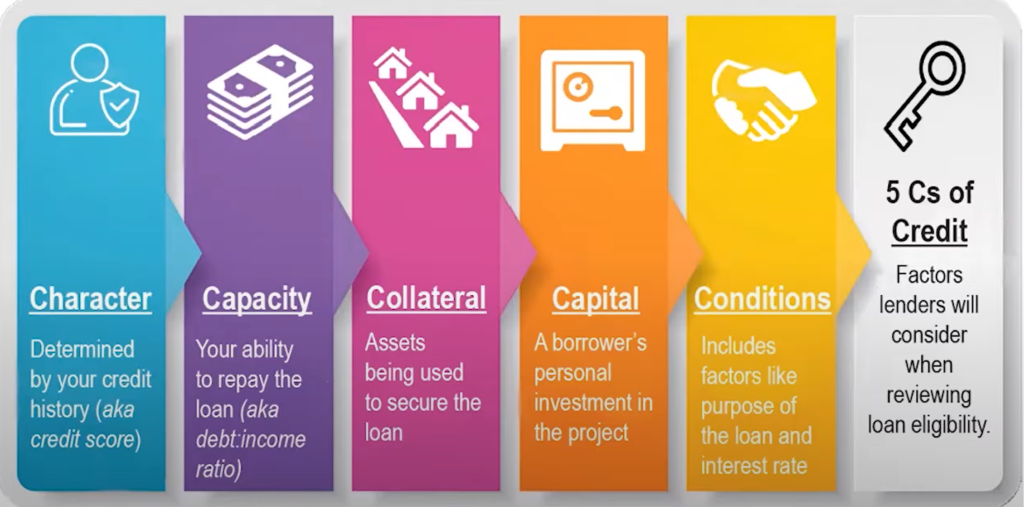When applying for a Mortgage in Canada, you have to get eligible for a number of criteria’s – the 5 C’s of Credit. Thus, here are the 5 things to keep in mind when applying for a Mortgage in Canada.
To understand the concept of the 5 Cs of Credit, we have to first understand the concept of Credit. When it comes to the Real Estate and Mortgage Brokerage Industry, Credit means borrowing finances (money) or a physical substance that has monetary value. When someone takes a sum of money or a physical property that has monetary value on credit from someone, they take it as a loan. It can be defined as a value given in advance to someone and offer them time to pay that back.
Now, we all know that Money Grows with Time. So, whenever you lend someone a physical thing that has monetary value added to it, at the time of paying back, the person also has to give the added value of time taken to repay the same thing.
For Example
If A borrowed $10 from B today and decided to pay him back the same $10 after 7 days, then we can say that A took a loan of $10 from B. Now, when A is paying back the same $10 to B after 7 days, he also has to pay an extra charge for the time gap he took to return the same $10 to B. This is because, if B had invested the same $10 in a financial reserve, he must have earned some interest on $10 after 7 days. Money grows with time. The same $10 will have more value than its original value of $10 in future. That is why, we have “Present Value” and “Future Value” of Money.
Get the Key takeaways of the blog from the video below –
Financial Institutions like Banks work on the same principle. They lend money to people in need and charge a rate of interest for the time they take to repay the principal amount. Now, giving out money can be riskier if they are not pre-cautious about the situations of the person, they are lending the money. If the lender does not get repaid, he can occur a loss on the sum of money lent.
To check the probability of getting the money repaid, lenders use some tactics to understand the borrower’s capacity to repay the money they have lent. Here comes the 5 Cs of Credit that lenders consider when they have to lend money to the borrowers.
The 5 Cs of Credit are:

Each one of them has their own characteristics and importance while assessing the borrower’s repayment credibility.
[I] Character
Although it’s called character, the 1st C more specifically refers to Credit History, which is a borrower’s reputation or track record for repaying debts. This information appears on the borrower’s credit reports. Generated by the three major credit bureaus (TransUnion and Equifax), credit reports contain detailed information about how much an applicant has borrowed in the past and whether they have repaid loans on time. These reports also contain information on collection accounts and bankruptcies, and they retain most information for 7 to 10 years. Information from these reports helps lenders evaluate the borrower’s credit risk. The credit bureaus use this information to create a credit score, a tool lender use for a quick snapshot of creditworthiness before looking at credit reports. The Credit Scores range from 300 to 850 and are designed to help lenders predict the likelihood that an applicant will repay a loan on time.
[II] Capacity
Capacity measures the borrower’s ability to repay a loan by comparing income against recurring debts and assessing the borrower’s Debt-to-Income (DTI) Ratio. Lenders calculate DTI by adding a borrower’s total monthly debt payments and dividing that by the borrower’s gross monthly income. The lower an applicant’s DTI, the better the chance of qualifying for a new loan. Every lender is different, but many lenders prefer an applicant’s DTI to be around 35% or less before approving an application for new financing.
[III] Capital
Lenders also consider any capital the borrower puts toward a potential investment. A large contribution by the borrower decreases the chance of default. Borrowers who can put a down payment on a home, for example, typically find it easier to receive a mortgage. Down Payments indicate the borrower’s level of seriousness, which can make lenders more comfortable extending credit. Down payment size can also affect the rates and terms of a borrower’s loan. Generally speaking, larger down payments result in better rates and terms. With mortgage loans, for example, a down payment of 20% or more should help a borrower avoid the requirement to purchase additional Private Mortgage Insurance (PMI).
[IV] Collateral
Collateral can help a borrower secure loan. It gives the lender the assurance that if the borrower defaults on the loan, the lender can get something back by repossessing the collateral. The collateral is often the object one is borrowing the money for: Auto loans, for instance, are secured by cars, and mortgages are secured by homes. For this reason, Collateral-backed Loans are sometimes referred to as Secured Loans or Secured Debt. They are generally considered to be less risky for lenders to issue. As a result, loans that are secured by some forms of collateral are commonly offered with lower interest rates and better terms compared to other unsecured forms of financing.
[V] Conditions
Conditions can refer to how a borrower intends to use the money. The conditions of the loan, such as the interest rate and amount of principal, influence the lender’s desire to finance the borrower. Consider a borrower who applies for a car loan or a home improvement loan. A lender may be more likely to approve those loans because of their specific purpose, rather than a signature loan, which could be used for anything. Additionally, lenders may consider conditions that are outside of the borrower’s control, such as the state of the economy, industry trends, or pending legislative changes.
Understanding the 5 Cs is critical to your ability to access credit and do it at the lowest cost. Delinquency in just one area can dramatically affect the credit you get offered. If you find that you are denied access to credit or only offered it at exorbitant rates, you can use your knowledge of the 5 Cs to do something about it. Work on improving your credit score, save up for a larger down payment, or pay off some of your outstanding debt.
Join Alberta Real Estate School for expert help with understanding the concepts of Real Estate and getting uncommon and detailed tutoring sessions summarized as per your needs. Get our personalized Notes designed to get you through the Real Estate Exams in the first attempt! Visit our list of Real Estate Tutoring Sessions for details.
If you have any doubts for Exam Preparation of any of the real estate courses or topics, reach out to us directly at 587.936.7779.
You can also listen to the blog on our Podcast below. We hope you found this blog useful. Happy Realtoring!


